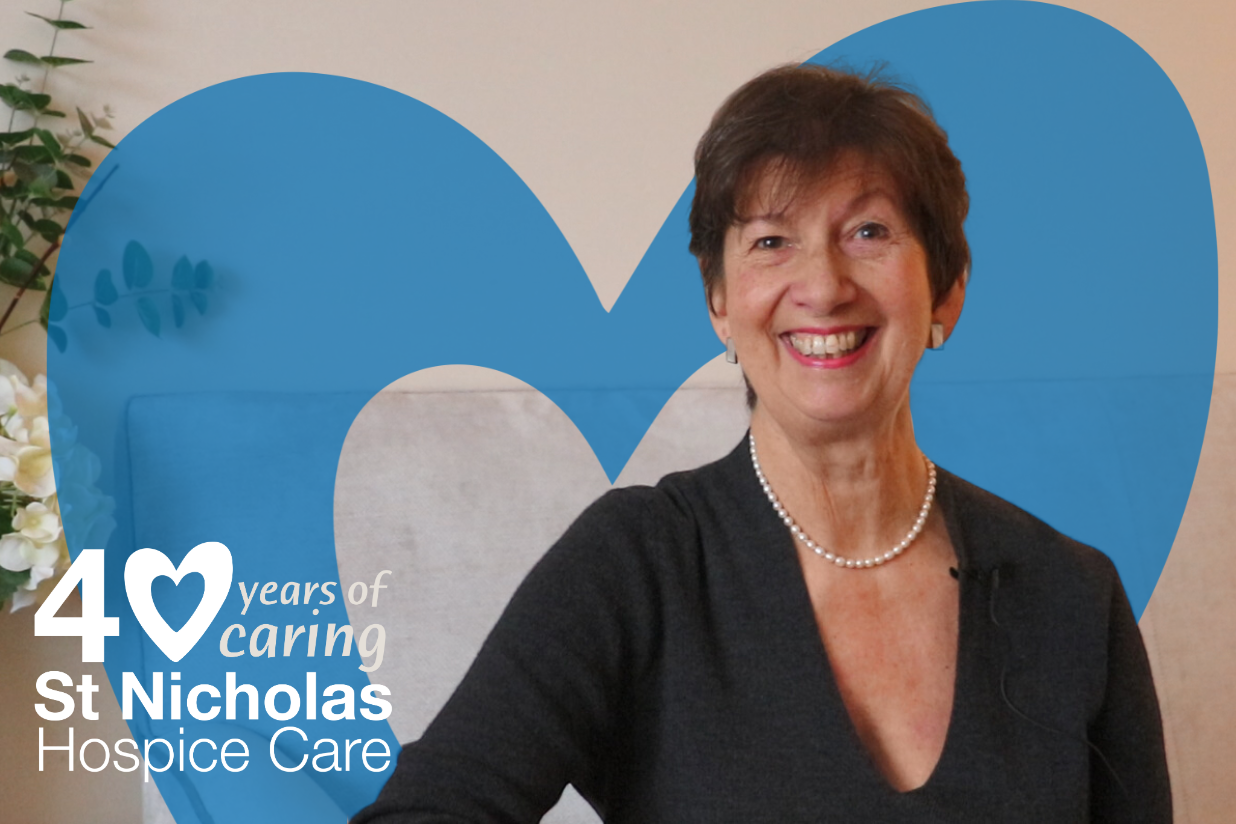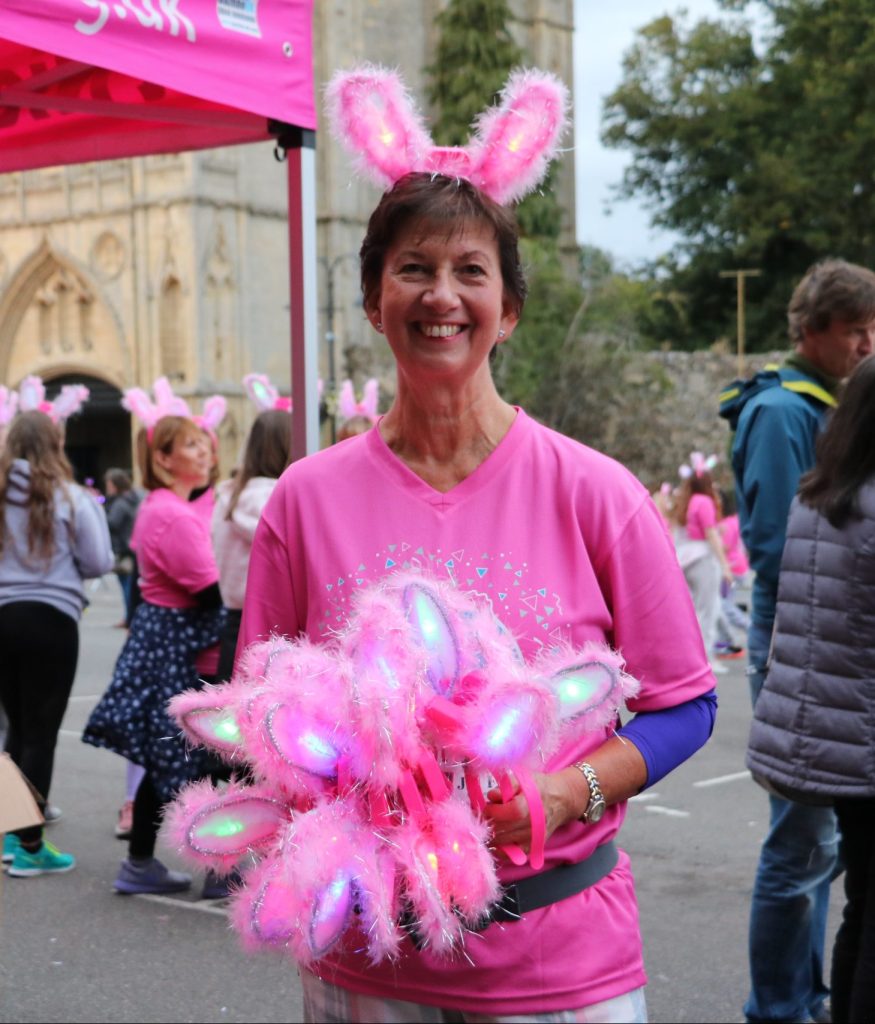Call our 24/7 advice line for health care professionals and families if you need support with symptom management and end of life care - 01284 766133.

Barbara Gale
Having spent 14 years at the helm of the Hospice, Dr Barbara Gale, MBE, retired from her role in 2021.
With her career in palliative care spanning 40 years, the Hospice was recognised for many significant achievements under Barbara’s leadership, including national awards for its innovative clinical work.
Hearing the amazing stories
Looking at the services the Hospice provided and listening to people about their experiences of dying, death and grief, whether they had experienced hospice care or not, was something that was very important to Barbara and was one of the reasons she says she stayed at St Nic’s for so long.
She explains: “What helped me stay so long, I think, as well as the passion and commitment for the work, was always listening to people and hearing their experiences.
“Hearing the amazing stories about how we had supported people in the community, on the ward, or in the hospital or how we supported their families in bereavement.
“But also, then hearing the stories of people that we weren’t serving. And I think keeping that connection as to why the Hospice is there really kept me going.”
In 2017, the Hospice began to work on looking at its services and how they could be developed to reach more people. An important part of this work was listening to people’s stories and hearing their experiences of dying, death and grief.
I listened to the audio tapes, watched the videos, and read the transcripts. I heard how many people felt ill-prepared for death and grief, how they didn’t know what to do, how they didn’t know which services to ring, and how if they were in contact with the Hospice, that really helped. But other people wanted to do more for themselves. And that was when I really started to realise how we as a society prepare for birth, but we don’t prepare ourselves for death.
“I felt that that was a real shift in my thinking and perhaps other people’s thinking, that the Hospice’s role should be much more about equipping communities to be able to support each other through death and grief.”
So where did Barbara’s journey with St Nic’s begin?
“I came to St Nicholas Hospice Care in 2005, first as Clinical Services Director. I’d known the Hospice for years because I’d worked at the Arthur Rank Hospice in Cambridge for 10 years,” Barbara recalled.
In 2007, St Nic’s advertised for a new Chief Executive Officer, and Barbara decided to apply for the role.
She says: “I’d worked in hospice care since the 80s in many different roles as a nurse, therapist, in education, and more lately as a manager.
“I felt I knew the work of hospice care really well, and really enjoyed my two years at St Nic’s as Clinical Services Director. I really loved working there. It was an absolutely great team, and I felt very proud to apply for the job. I was so very pleased to be successful and be appointed as Chief Executive.”
I saw you on the bus
As CEO, Barbara was involved in all aspects of the Hospice, and promoting St Nic’s and championing what the charity was doing were big parts of that.
From speaking at conferences to pulling on her comfiest trainers to participate in our Girls Night Out walk, she even found herself as one of the faces of an advertising campaign.
I remember my face being on the back of a bus for a year to promote Legacy Giving, however large or small, that was the line. It was quite hard when people said, ‘I saw you on the bus, Barbara,’ and I’d say, ‘I wasn’t on the bus.’ They went, ‘Oh, no, on the back of the bus going around Haverhill.'
“Of course, the other great part of being Chief Executive is that you get to talk about the Hospice. You go out to meetings locally, nationally, and even internationally. And you talk about the great work of St Nicholas Hospice Care. And I was always so proud to do that. And that’s a great part of the role of a Chief Executive.”
I don’t think I’ll forget that
Having spent such a long time at St Nic’s, Barbara’s time is filled with memories and plenty of stories to tell, from royal visits to awards for services and everything in between.
Barbara remembers: “I’d only been Clinical Services Director for two weeks when we heard that we were having the then Prince of Wales and the Duchess of Cornwall come for a visit and to do a tour. And that was an absolutely amazing day when they met patients and families and staff and volunteers.
“Other times come to mind, things like the big refurbishment of the ward that we did when we had to move people from the ward into the day hospice and look after them there for several weeks while the ward was completely gutted and refurbished.
“Then there was Storm Doris during which a tree in the garden was threatening to fall. We had to evacuate the whole building and move patients and families out of the ward into the hospital and into care homes. And then we had to get them back in after the tree had been cut down. So that was quite a moment. I don’t think I’ll forget that.
“I think seeing Girls Night Out grow from just a few hundred people to the thousands that we saw on Angel Hill with their bunny ears and the cathedral lit up in pink was also an amazing time.

“Personally, being awarded an MBE in 2018. But I felt I received that on behalf of the Hospice, for the staff, and all the volunteers, so that was a special moment.”
The germ of an idea
In 2010, St Nic’s set up its Hospice Neighbours initiative, which sees teams of local volunteers provide practical support and companionship to those facing the end of life and their loved ones.
The service’s success is among Barbara’s favourite achievements.
She says: “It went from a germ of an idea to being started and then won an award.
“I know that hundreds, if not thousands, of volunteers have gone through the scheme. That cascade effect from that germ of an idea of just people needing more neighbours to support them where they were dying was something that I was really proud of and was pleased to see grow.
“But I couldn’t have done it without a team that then supported it and managed it and all the volunteers that then took part.”
The Hospice would not be here today if it had not been for him
When asked about who had the biggest influence on her during her time at St Nic’s, the answer was an easy one: Canon Richard Norburn MBE, the Hospice’s founder, the person whose idea that there must be something better for those facing dying, death and grief inspires everything the Hospice does.
Barbara says: “He was always there to support, to advise, his passion, commitment as an ambassador for the Hospice. The time that he spent with staff and volunteers was a great example to any leader. His memory for names always put me to shame. I don’t know how he did it. His ability to speak in a very large space without a microphone. So, the Hospice would not be here today if it had not been for him. His legacy that there is always more work to do is something that has to live on.”
Always more work to do
“I think the Hospice is there to champion the needs of people as they face death and grief, to be that voice, always to see what more can be done all through the community.
“I think part of that legacy is that there is always more work to do to make sure that everybody has a better experience in that last chapter of their life. That’s the legacy the Hospice started with, and it is even more important today,” adds Barbara.
Barbara’s three words to describe the Hospice?
Community, compassion, and hope.
